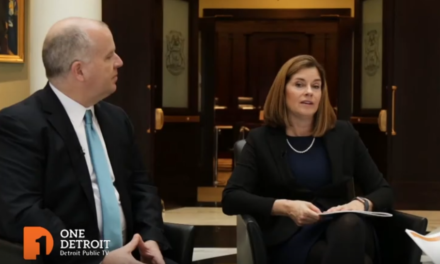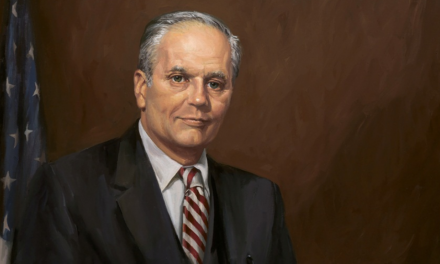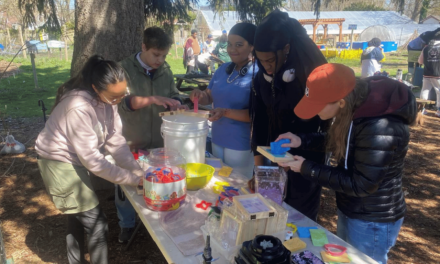Detroit Public Theatre is closing out its first season in its new theater space with “Passing Strange,” the 2008 Tony Award-winning rock musical with a powerful message.
Passing Strange tells the story of a young Black musician on a coming-of-age journey to find himself, his artistic voice, and his sense of what it means to be Black in both the world of art and the world at large. His journey takes him from LA to Amsterdam to Berlin, as he explores different styles of music and schools of philosophy and spirituality, trying to find what he calls “The Real.”
RELATED: Detroit Public Theatre presents Heather Raffo’s ‘Noura,’ an Iraqi American story of belonging
RELATED: Underground sound: Detroit’s punk rock history on display at the All-Star Garage Rock Punk Revue
The musical has been on Detroit Public Theatre’s radar since it began eight seasons ago, Detroit Public Theatre Producing Artistic Director Courtney Burkett explained. The original production was written by Stew and Heidi Rodewald. John Sloan III directed the Detroit Public Theatre Production.
One Detroit editor Chris Jordan attended the Theatre’s performance of “Passing Strange” and spoke with Sloan III, actress Lulu Fall, and Burkett after about the show’s legacy, what makes it unique among rock musicals, how art and media can be used as a vehicle for cultural conversations, and the creative process behind bringing the Broadway production to the local stage.
Full Transcript:
John Sloan III, Director, “Passing Strange”: What’s interesting and really powerful about this show is that it’s written by a black man and a white woman. But it tells a story of identity. One that is very unique to the black experience, but that also has archetypal themes that I think anybody can be drawn to..
Lulu Fall, Actress, ‘Passing Strange’: It pulls something out of each person because it’s such a multilayered show. And there aren’t many musicals out there that are multilayered in this particular fashion.
Courtney Burkett, Founder & Producing Artistic Director, Detroit Public Theater: This has been our first season in our new home, which has been tremendous. Closing it out with this big rock musical is really very exciting to see kind of the full capabilities of what we can do in this room.
John Sloan III: ‘Passing Strange’ is a wonderful, huge, intimate show that walks you through the journey of one person looking for their sense of self, grappling to understand who they are. Who they are in context of what they want for themselves, in context of the weight of other people’s expectations. And also, what it means to be able to love and to be loved even when you don’t necessarily understand why.
Courtney Burkett: This is a play that we have been wanting to produce since we were founded. This is our eighth season. It’s the biggest show we’ve ever done. So it was really a big investment for us with a seven-person cast and a full band on stage the whole time. But we really felt like it was an important story to tell. We’re really interested in kind of contemporary work and work that Detroit audiences will see their own lives reflected in. And we really feel like the journey of this story and of this play is something that audiences will see and not– it’s really kind of a new way of experiencing musical theater. I think it’s not what most people think of when they think of musical theater. It’s not really traditional.
Lulu Fall: I love shows that break the fourth wall and in “Passing Strange”, that fourth wall is completely broken by the narrator. You know, first and foremost, just interacting with the audience. So that alone, just sets this musical apart. This also being an autobiographical piece. That is another thing that completely blows all the other shows out of the water. Because of the fact that it’s so intimate, it breaks the fourth wall. It’s funny. It’s raunchy, it is sad. It’s real.
John Sloan III: What you see with “Passing Strange” is, you see a show that just as in its existence, is revolutionary. Telling the story of a kid who is being told that he’s not black enough and a kid who then struggles to try to find himself in an environment surrounded by a whole bunch of white people and Europeans. That struggle is what is revolution.
The telling of that story is absolutely revolutionary. What is accessible, though, is just that it’s good storytelling. It’s just good music. It’s a story that everybody’s been through. Everybody has been 22 or will be 22. Everybody has been 16 or will be 16. Everybody has had that journey of getting into an argument with your parents and not knowing that you would regret that argument until ten or 15 years later. Everybody knows what it’s like to have to find yourself. Everybody has been one of these people on the stage at some point in their lives, in their journey.
Courtney Burkett: John Sloan is an incredible artist who has been working in the Detroit region now for a while. John and I met pretty early in the life of Detroit Public Theater, and immediately I really admired him. And so, we were really happy that he accepted the job of taking on the direction of this play and this production, and he really brought it to life beautifully.
Lulu Fall: What I love about his directing is, of course, he has a vision and of course, there’s certain things that he wants us to do. But I also really, really, really love that he trusts us as actors, as intuitive artists to try some things. Some things work, some things don’t work, and that’s fine. But I do love that he allows for that space. If art imitates life, then we need way more diversity on stage. Not just, you know, color, and race, and gender, but stories. There’s so many stories out there walking down the street. No one has the same story. And that’s what makes me gravitate not only towards “Passing Strange,” but generally to nontraditional musical theater, because it just shake things up.
John Sloan III: Especially in this context of what’s happening in theater today, right? So you go back and you look at the last five years, four years, really ever since the summer of 2020 and this uprising because of George Floyd, Breonna Taylor, Ahmaud Arbery, and this realization that parts of the country had that racism still exists and is still a thing. And the way that, that then started to trickle through the artistic communities and you started to see in different industries the leaders of those industries recognizing their impact and their influence in those systems. The question then becomes, is that recognition honest? Is it truthful? Or is it a mile wide and an inch deep?
It’s not just about producing content. It’s about telling stories and valuing the telling of those stories. Not because of the identity around that, but because the understanding that art and media can share cultural conversation. And you can learn about somebody who you might not have met before through their music, through their food, through watching their story on a stage. And what “Passing Strange” did when it was on Broadway in 2008, what it’s doing now here at Detroit Public Theater, this is one of those great shows that can meet two goals, right? It’s just a phenomenal piece of work, but it also has a very powerful message. This is a show that invites you to talk back to us, that invites you to have a conversation with us. Very similar to the other work of Domonique Morisseau or Erika Dickerson-Despenza says, hey, come and be involved and welcome into this community.
Courtney Burkett: The circle is complete when the audience comes in and the audience gets an experience and feels at home in this space because we built it for everyone.
John Sloan III: It’s just joyful. And the actors, the artists, everybody works really hard to make sure that you can not just come into the show and learn something, but you can come into the show and feel something that you can come into the show and have a really good time.
Stay Connected:
Subscribe to One Detroit’s YouTube Channel & Don’t miss One Detroit Mondays and Thursdays at 7:30 p.m. on Detroit Public TV, WTVS-Channel 56.
Catch the daily conversations on our website, Facebook, Twitter @DPTVOneDetroit, and Instagram @One.Detroit
View Past Episodes >
Watch One Detroit every Monday and Thursday at 7:30 p.m. ET on Detroit Public TV on Detroit Public TV, WTVS-Channel 56.




